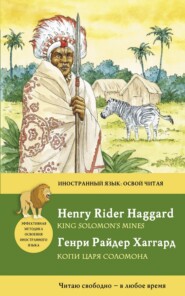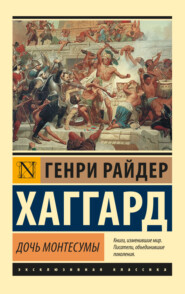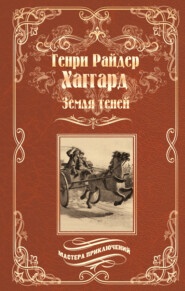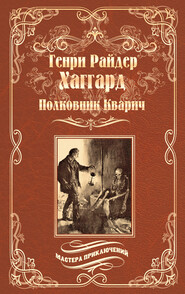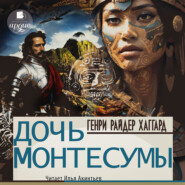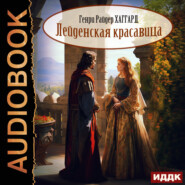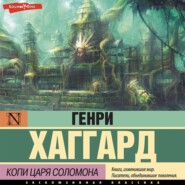По всем вопросам обращайтесь на: info@litportal.ru
(©) 2003-2024.
✖
The World's Desire
Настройки чтения
Размер шрифта
Высота строк
Поля
The ancient men drew nigh. They took no heed of the dying or the dead: on they walked, through blood and wine and fallen tables and scattered arms, till they stood before the Pharaoh.
“Pharaoh! Pharaoh! Pharaoh!” they cried again. “Dead are the first-born of Khem at the hand of Jahveh. Wilt thou let the people go?”
Then Pharaoh lifted his face and cried:
“Get you gone – you and all that is yours. Get you gone swiftly, and let Khem see your face no more.”
The people heard, and the living left the hall, and silence fell on the city, and on the dead who died of the sword, and the dead who died of the pestilence. Silence fell, and sleep, and the Gods’ best gift – forgetfulness.
III THE BATHS OF BRONZE
Even out of this night of dread the morning rose, and with it came Rei, bearing a message from the King. But he did not find the Wanderer in his chamber. The Palace eunuchs said that he had risen and had asked for Kurri, the Captain of the Sidonians, who was now the Queen’s Jeweller. Thither Rei went, for Kurri was lodged with the servants in a court of the Royal House, and as the old man came he heard the sound of hammers beating on metal. There, in the shadow which the Palace wall cast into a little court, there was the Wanderer; no longer in his golden mail, but with bare arms, and dressed in such a light smock as the workmen of Khem were wont to wear.
The Wanderer was bending over a small brazier, whence a flame and a light blue smoke arose and melted into the morning light. In his hand he held a small hammer, and he had a little anvil by him, on which lay one of the golden shoulder-plates of his armour. The other pieces were heaped beside the brazier. Kurri, the Sidonian, stood beside him, with graving tools in his hands.
“Hail to thee, Eperitus,” cried Rei, calling him by the name he had chosen to give himself. “What makest thou here with fire and anvil?”
“I am but furbishing up my armour,” said the Wanderer, smiling. “It has more than one dint from the fight in the hall;” and he pointed to his shield, which was deeply scarred across the blazon of the White Bull, the cognizance of dead Paris, Priam’s son. “Sidonian, blow up the fire.”
Kurri crouched on his hams and blew the blaze to a white heat with a pair of leathern bellows, while the Wanderer fitted the plates and hammered at them on the anvil, making the jointures smooth and strong, talking meanwhile with Rei.
“Strange work for a prince, as thou must be in Alybas, whence thou comest,” quoth Rei, leaning on his long rod of cedar, headed with an apple of bluestone. “In our country chiefs do not labour with their hands.”
“Different lands, different ways,” answered Eperitus. “In my country men wed not their sisters as your kings do, though, indeed, it comes into my mind that once I met such brides in my wanderings in the isle of the King of the Winds.”
For the thought of the Æolian isle, where King Æolus gave him all the winds in a bag, came into his memory.
“My hands can serve me in every need,” he went on. “Mowing the deep green grass in spring, or driving oxen, or cutting a clean furrow with the plough in heavy soil, or building houses and ships, or doing smith’s work with gold and bronze and grey iron – they are all one to me.”
“Or the work of war,” said Rei. “For there I have seen thee labour. Now, listen, thou Wanderer, the King Meneptah and the Queen Meriamun send me to thee with this scroll of their will,” and he drew forth a roll of papyrus, bound with golden threads, and held it on his forehead, bowing, as if he prayed.
“What is that roll of thine?” said the Wanderer, who was hammering at the bronze spear-point, that stood fast in his helm.
Rei undid the golden threads and opened the scroll, which he gave into the Wanderer’s hand.
“Gods! What have we here?” said the Wanderer. “Here are pictures, tiny and cunningly drawn, serpents in red, and little figures of men sitting or standing, axes and snakes and birds and beetles! My father, what tokens are these?” and he gave the scroll back to Rei.
“The King has made his Chief Scribe write to thee, naming thee Captain of the Legion of Pasht, the Guard of the Royal House, for last night the Captain was slain. He gives thee a high title, and he promises thee houses, lands, and a city of the South to furnish thee with wine, and a city of the North to furnish thee with corn, if thou wilt be his servant.”
“Never have I served any man,” said the Wanderer, flushing red, “though I went near to being sold and to knowing the day of slavery. The King does me too much honour.”
“Thou wouldest fain begone from Khem?” asked the old man, eagerly.
“I would fain find her I came to seek, wherever she may be,” said the Wanderer. “Here or otherwhere.”
“Then, what answer shall I carry to the King?”
“Time brings thought,” said the Wanderer; “I would see the city if thou wilt guide me. Many cities have I seen, but none so great as this. As we walk I will consider my answer to your King.”
He had been working at his helm as he spoke, for the rest of his armour was now mended. He had drawn out the sharp spear-head of bronze, and was balancing it in his hand and trying its edge.
“A good blade,” he said; “better was never hammered. It went near to doing its work, Sidonian,” and he turned to Kurri as he spoke. “Two things of thine I had: thy life and thy spear-point. Thy life I gave thee, thy spear-point thou didst lend me. Here, take it again,” and he tossed the spear-head to the Queen’s Jeweller.
“I thank thee, lord,” answered the Sidonian, thrusting it in his girdle; but he muttered between his teeth, “The gifts of enemies are gifts of evil.”
The Wanderer did on his mail, set the helmet on his head, and spoke to Rei. “Come forth, friend, and show me thy city.”
But Rei was watching the smile on the face of the Sidonian, and he deemed it cruel and crafty and warlike, like the laugh of the Sardana of the sea. He said nought, but called a guard of soldiers, and with the Wanderer he passed the Palace gates and went out into the city.
The sight was strange, and it was not thus that the old man, who loved his land, would have had the Wanderer see it.
From all the wealthy houses, and from many of the poorer sort, rang the wail of the women mourners as they sang their dirges for the dead.
But in the meaner quarters many a hovel was marked with three smears of blood, dashed on each pillar of the door and on the lintel; and the sound that came from these dwellings was the cry of mirth and festival. There were two peoples; one laughed, one lamented. And in and out of the houses marked with the splashes of blood women were ever going with empty hands, or coming with hands full of jewels, of gold, of silver rings, of cups, and purple stuffs. Empty they went out, laden they came in, dark men and women with keen black eyes and the features of birds of prey. They went, they came, they clamoured with delight among the mourning of the men and women of Khem, and none laid a hand on them, none refused them.
One tall fellow snatched at the staff of Rei.
“Lend me thy staff, old man,” he said, sneering; “lend me thy jewelled staff for my journey. I do but borrow it; when Yakûb comes from the desert thou shalt have it again.”
But the Wanderer turned on the fellow with such a glance that he fell back.
“I have seen thee before,” he said, and he laughed over his shoulder as he went; “I saw thee last night at the feast, and heard thy great bow sing. Thou art not of the folk of Khem. They are a gentle folk, and Yakûb wins favour in their sight.”
“What passes now in this haunted land of thine, old man?” said the Wanderer, “for of all the sights that I have seen, this is the strangest. None lifts a hand to save his goods from the thief.”
Rei the Priest groaned aloud.
“Evil days have come upon Khem,” he said. “The Apura spoil the people of Khem ere they fly into the Wilderness.”
Even as he spoke there came a great lady weeping, for her husband was dead, and her son and her brother, all were gone in the breath of the pestilence. She was of the Royal House, and richly decked with gold and jewels, and the slaves who fanned her, as she went to the Temple of Ptah to worship, wore gold chains upon their necks. Two women of the Apura saw her and ran to her, crying:
“Lend to us those golden ornaments thou wearest.”
Then, without a word, she took her gold bracelets and chains and rings, and let them all fall in a heap at her feet. The women of the Apura took them all and mocked her, crying:
“Where now is thy husband and thy son and thy brother, thou who art of Pharaoh’s house? Now thou payest us for the labour of our hands and for the bricks that we made without straw, gathering leaves and rushes in the sun. Now thou payest for the stick in the hand of the overseers. Where now is thy husband and thy son and thy brother?” and they went still mocking, and left the lady weeping.
But of all sights the Wanderer held this strangest, and many such there were to see. At first he would have taken back the spoil and given it to those who wore it, but Rei the Priest prayed him to forbear, lest the curse should strike them also. So they pressed on through the tumult, ever seeing new sights of greed and death and sorrow. Here a mother wept over her babe, here a bride over her husband – that night the groom of her and of death. Here the fierce-faced Apura, clamouring like gulls, tore the silver trinkets from the children of those of the baser sort, or the sacred amulets from the mummies of those who were laid out for burial, and here a water-carrier wailed over the carcass of the ass that won him his livelihood.
At length, passing through the crowd, they came to a temple that stood near to the Temple of the God Ptah. The pylons of this temple faced towards the houses of the city, but the inner courts were built against the walls of Tanis and looked out across the face of the water. Though not one of the largest temples, it was very strong and beautiful in its shape. It was built of the black stone of Syene, and all the polished face of the stone was graven with images of the Holy Hathor. Here she wore a cow’s head, and here the face of a woman, but she always bore in her hands the lotus-headed staff and the holy token of life, and her neck was encircled with the collar of the gods.
“Here dwells that Strange Hathor to whom thou didst drink last night, Eperitus,” said Rei the Priest. “It was a wild pledge to drink before the Queen, who swears that she brings these woes on Khem. Though, indeed, she is guiltless of this, with all the blood on her beautiful head. The Apura and their apostate sorcerer, whom we ourselves instructed, bring the plagues on us.”
“Does the Hathor manifest herself this day?” asked the Wanderer.
“That we will ask of the priests, Eperitus. Follow thou me.”
Now they passed down the avenue of sphinxes within the wall of brick, into the garden plot of the Goddess, and so on through the gates of the outer tower. A priest who watched there threw them wide at the sign that was given of Rei, the Master-Builder, the beloved of Pharaoh, and they came to the outer court. Before the second tower they halted, and Rei showed to the Wanderer that place upon the pylon roof where the Hathor was wont to stand and sing till the hearers’ hearts were melted like wax. Here they knocked once more, and were admitted to the Hall of Assembly where the priests were gathered, throwing dust upon their heads and mourning those among them who had died with the Firstborn. When they saw Rei, the instructed, the Prophet of Amen, and the Wanderer clad in golden armour who was with him, they ceased from their mourning, and an ancient priest of their number came forward, and, greeting Rei, asked him of his errand. Then Rei took the Wanderer by the hand and made him known to the priest, and told him of those deeds that he had done, and how he had saved the life of Pharaoh and of those of the Royal House who sat at the feast with Pharaoh.






